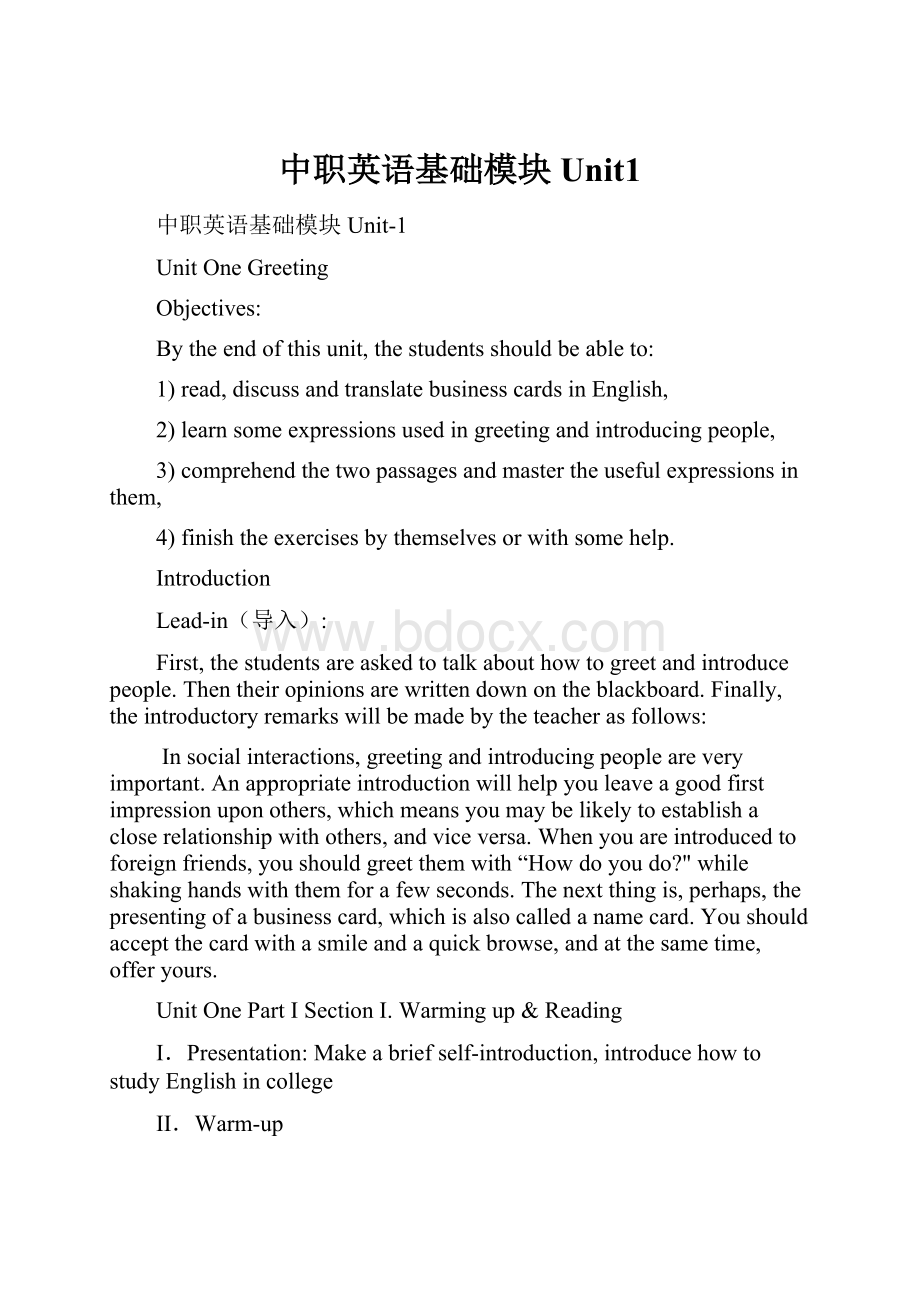中职英语基础模块Unit1.docx
《中职英语基础模块Unit1.docx》由会员分享,可在线阅读,更多相关《中职英语基础模块Unit1.docx(14页珍藏版)》请在冰豆网上搜索。

中职英语基础模块Unit1
中职英语基础模块Unit-1
UnitOneGreeting
Objectives:
Bytheendofthisunit,thestudentsshouldbeableto:
1)read,discussandtranslatebusinesscardsinEnglish,
2)learnsomeexpressionsusedingreetingandintroducingpeople,
3)comprehendthetwopassagesandmastertheusefulexpressionsinthem,
4)finishtheexercisesbythemselvesorwithsomehelp.
Introduction
Lead-in(导入):
First,thestudentsareaskedtotalkabouthowtogreetandintroducepeople.Thentheiropinionsarewrittendownontheblackboard.Finally,theintroductoryremarkswillbemadebytheteacherasfollows:
Insocialinteractions,greetingandintroducingpeopleareveryimportant.Anappropriateintroductionwillhelpyouleaveagoodfirstimpressionuponothers,whichmeansyoumaybelikelytoestablishacloserelationshipwithothers,andviceversa.Whenyouareintroducedtoforeignfriends,youshouldgreetthemwith“Howdoyoudo?
"whileshakinghandswiththemforafewseconds.Thenextthingis,perhaps,thepresentingofabusinesscard,whichisalsocalledanamecard.Youshouldacceptthecardwithasmileandaquickbrowse,andatthesametime,offeryours.
UnitOnePartISectionI.Warmingup&Reading
I.Presentation:
Makeabriefself-introduction,introducehowtostudyEnglishincollege
II.Warm-up
Businesscardsareveryusefulforintroducingpeople.Nowlet'sreadthefollowingbusinesscards.
Sample1Sample2onbook
Someusefulexpressions(refertotheDataBankintheWorkBook)
A.Greetings
B.Responsestogreetings
Hi!
Howdoyoudo?
Hello,youmustbeJackfromAmerica.
Howareyou?
Hello.
Howarethingswithyou?
Howareyoudoing?
Howiseverything?
Youaredoingallright?
Howitgoes?
Howislife,John?
Excuseme.AreyouKitty?
Howdoyoudo?
Fine,justfine.
Fine,thankyou.
Quitewell.Andyou?
Theusual.Howaboutyou?
So-so.Andwhataboutyou?
Nothingparticular.
Nottoobad.
Nicetomeetyou.
Veryhappytoseeyou.
C.Self-Introduction
D.Takingleave
⑤(Para3)ButAmericansdosometimesasksuchquestions.
Analysis:
Doisusedheretoemphasizethefollowingverb.Itmeans“的的确确,真的”
Translation:
但是美国人有时确实会问此类问题。
Example:
Idoappreciateyourhelp.
⑥(Para3)Inthiswaytheycangetbetteracquaintedwithyouandhaveatopicforbeginningafriendlyconversationwithyou.
Analysis:
Andisusedheretointroduceacoordinateclause,whichfurtherdevelopsthetopicbeingdiscussed.
Translation:
他们想要得到你对这些询问的回答,这样就能更多地了解你,并以此为开端与你友好地侃上一场。
Example:
InthiswayyoucanimproveyourspokenEnglishanddo
(2)UsefulWordsandExpressions
①.Greet:
v.saywordsofwelcometo,expressone’sfeelingsonreceivingsb.
Example:
ItisimportantforthestudentstolearnhowtogreetpeopleinEnglish.Practice:
a.我们经常用微笑表达喜悦。
Weoftenexpressourhappinesswithasmile.b.她说话经常带浓重的乡音。
Sheoftenspeakswithastronglocalaccent.
②.Similarly:
同样
Example:
Similarly,therearealsomanyproverbsinChinese.
Practice:
a.同样,格林教授也无法忍耐惰性。
Similarly,ProfessorGreencouldn’tbearlaziness.
b.同样,他们也不愿意依赖他人。
Similarly,theydon’twanttodependuponothers.
③.Tosb.:
对某人来说
Example:
Totheparents,ahealthychildisthemostessentialthing.
Practice:
a.对一个商人来说,利润是最重要的事。
Toabusinessman,profitisthemostimportantthing.
b.对我来说,一个幸福的家庭是最有价值的东西。
Tome,ahappyfamilyisthemostvaluablething.
④.Leaveanimpressionon/uponsb.给某人留下印象
Leaveadeep/good/niceimpressionon/uponsb.
Example:
一个友好的问候会使谈话有一个良好的开端。
Afriendlygreetingwillmakeagoodbeginningforatalk.
Practice:
一个幽默的句子会给一堂课增添一股活力(livelytouch)。
Ahumoroussentencewillgivealivelytouchtothelesson.
⑤.such:
如此的,这样的
Example:
Suchalifemaybetoohardtothelittlegirl.
Practice:
a.这样的结局对我来说是太匆忙了。
Suchanendingmaybetoohastytome.
b.这样一种天气对游客来说是太热了。
Suchweathermaybetoohottothetourists.
⑥.Acquaint:
v.makefamiliarwith,gettoknow,revealtosb.结识,认识
Example:
Youshouldtrytoacquainthimwiththefactsofthecase.
Practice:
a.Ihavebecomeacquaintedwithmynewduties.
b.TheoverseasstudentshavemakethemselvesacquaintedwiththeirChinesepeers.
⑦.Prefer:
v.likebetter,wouldratherdo更喜欢,宁愿
Example:
Iprefertohavethemeetinginthemorningratherthanintheafternoon.Practice:
Whichdoyouprefer,teaorcoffee?
V.Askthestudentstoreadthepassageagainandbefamiliarwiththosenewwordsandphrases.AskthestudentstofinishtheReadingComprehensionpartbythemselvesfirst,thengivethemtherightanswerandexplain.
VI.Assignments
Graspthenewwordsandphrases.
UnitOnePartII
SectionII:
LanguageStudy&Listening
I.AskthestudentstofillintheblanksinP3.
II.checktheanswersandexplain.
III.listentothedialogueinP4.
TakeDialogue1forexample
TeachingProcedure(Itaimstotrainthestudentswithproperlisteningstrategies.)
Pre-listening:
providethestudentswiththenewwordsandexpressions;
While-listening:
Askthestudentstolistentothedialogueforthefirsttimeandaskthemjusttounderstandthemainideaofthedialoguenottofinishtheexercises;listentothedialogueagainandaskthemtofinishexercise1;askthestudentstorepeatthedialoguesentencebysentenceafterthetapewhiletheteacherwillpressthebutton“pause”onthetaperecorder;listentothedialogueasawholeforthelasttime.
Post-listening:
Askthestudentstofinishexercise2,i.e.answeringquestions.Thisstepaimstochangelisteningtospeaking.
listeningtext:
WangLin:
Goodmorning,Ms.Gao.
Teacher:
Morning,WangLin.
WangLin:
Hi,FangMei.Thisisourteacher,Ms.Gao.
FangMei:
Goodmorning,Ms.Gao.
Teacher:
Goodmorning,FangMei.Nicetomeetyou!
FangMei:
Nicetomeetyou,too!
WangLin:
Teacher,FangMeiisanewstudent.Shewantstostudyinourclass.
Teacher:
Great!
Welcometoourclass!
FangMei:
Thankyou,Ms.Gao.
Teacher:
Youarewelcome.PleasegototheclassroomwithWangLin.
WangLin:
Ok.Let'sgotoourclassroom.Thisway,please.
FangMei:
Good-bye,Ms.Gao.
Teacher:
Good-bye.IV.Homework:
PreviewSectionIIItheSpeakingpartonP53
V.Conclusion:
ListeningisveryimportantinEnglishlearning.Becauseifyouwanttounderstandothers,youhavetolistenclearlywhatdotheytheirmean.
UnitOnePartIIISectionIII:
Grammar&Writing
Grammar
英语的基本句型
英语五种基本句型列式如下:
基本句型一:
SV(主+谓)
基本句型二:
SVP(主+谓+表)
基本句型三:
SVO(主+谓+宾)
基本句型四:
SVoO(主+谓+间宾+直宾)
基本句型五:
SVOC(主+谓+宾+宾补)
(一)基本句型一
此句型的句子有一个共同特点,即句子的谓语动词都能表达完整的意思。
这类动词叫做不及物动词,后面可以跟副词、介词短语、状语从句等。
S│V(不及物动词)
1.Thesun│wasshining.
2.Themoon│rose.
3.Theuniverse│remains.
4.Weall│breathe,eat,anddrink.
5.Who│cares?
6.Whathesaid│doesnotmatter.
7.They│talkedforhalfanhour.
8.Thepen│writessmoothly
1.太阳在照耀着。
2.月亮升起了。
3.宇宙长存。
4.我们大家都呼吸、吃和喝。
5.管它呢?
6.他所讲的没有什么关系。
7.他们谈了半个小时。
8.这支笔书写流利。
(二)基本句型二
此句型的句子有一个共同的特点:
句子谓语动词都不能表达一个完整的意思,必须加上一个表明主语身份或状态的表语构成复合谓语,才能表达完整的意思。
这类动词叫做连系动词。
系动词分两类:
be,look,keep,seem等属一类,表示情况;get,grow,become,turn等属另一类,表示变化。
be本身没有什么意义,只起连系主语和表语的作用。
其它系动词仍保持其部分词义。
S│V(是系动词)│P
1.This│is│anEnglish-Chinesedictionary.
2.Thedinner│smells│good.
3.He│fell│inlove.
4.Everything│looks│different.
5.He│isgrowing│tallandstrong.
6.Thetrouble│is│thattheyareshortofmoney.
7.Ourwell│hasgone│dry.
8.Hisface│turned│red.
1.这是本英汉辞典。
2.午餐的气味很好。
3.他堕入了情网。
4.一切看来都不同了。
5.他长得又高又壮。
6.麻烦的是他们缺少钱。
7.我们的井干枯了。
8.他的脸红了。
(三)基本句型三
此句型句子的共同特点是:
谓语动词都具有实义,都是主语产生的动作,但不能表达完整的意思,必须跟有一个宾语,即动作的承受者,才能使意思完整。
这类动词叫做及物动词。
S│V(及物动词)│O
1.Who│knows│theanswer?
2.She│smiled│herthanks.
3.He│hasrefused│tohelpthem.
4.He│enjoys│reading.
5.They│ate│whatwasleftover.
6.He│said│"Goodmorning."
7.I│want│tohaveacupoftea.
8.He│admits│thathewasmistaken.
1.谁知道答案?
2.她微笑表示感谢。
3.他拒绝帮他们的忙。
4.他喜欢看书。
5.他们吃了剩饭。
6.他说:
“早上好!
”
7.我想喝杯茶。
8.他承认犯了错误。
(四)基本句型四
此句型的句子有一个共同特点:
谓语动词必须跟有两个宾语才能表达完整的意思。
这两个宾语一个是动作的直接承受者,另一个是动作的间接承受者。
通常这一间接承受者用一个介词来连接,当动作的间接承受者在动作的直接承受者之前时,这一介词往往被省略。
S│V(及物)│o(多指人)│O(多指物)
1.She│ordered│herself│anewdress.
2.She│cooked│herhusband│adeliciousmeal.
3.He│brought│you│adictionary.
4.He│denies│her│nothing.
5.I│showed│him│mypictures.
6.I│gave│mycar│awash.
7.I│told│him│thatthebuswaslate.
8.He│showed│me│howtorunthemachine.
1.她给自己定了一套新衣裳。
2.她给丈夫煮了一餐美馔。
3.给你带来了一本字典。
4.他对她什么都不拒绝。
5.我给他看我的照片。
6.我洗了我的汽车。
7.我告诉他汽车晚点了。
8.他教我开机器。
(五)基本句型五
此句型的句子的共同特点是:
动词虽然是及物动词,但是只跟一个宾语还不能表达完整的意思,必须加上一个补充成分来补足宾语,才能使意思完整。
S│V(及物)│O(宾语)│C(宾补)
1.They│appointed│him│manager.
2.They│painted│thedoor│green.
3.This│set│them│thinking.
4.They│found│thehouse│deserted.
5.What│makes│him│thinkso?
6.We│saw│him│out.
7.He│asked│me│tocomebacksoon.
8.I│saw│them│gettingonthebus.
1.他们任命他当经理。
2.他们把门漆成绿色。
3.这使得他们要细想一想。
4.他们发现那房子无人居住。
5.他怎么会这样想?
6.我们送他出去。
7.他要我早点回来。
8.我看见他们上了那辆公共汽车。
但常用的英语句子并不都象基本句型这样简短,这些句子除了基本句型的成分不变外,通常是在这些成分的前面或后面增加一些修饰语(modifier)而加以扩大。
这些修饰语可以是单词(主要是形容词、副词和数词),也可以是各种类型的短语(主要是介词短语、不定式短语和分词短语)。
下面以基本句型五为例:
Wefoundthehallfull.
我们发现礼堂坐满了。
Wefoundthegreathallfullofstudentsandteachers.
我们发现大礼堂坐满了学生和教师。
Wefoundthegreathallfullofstudentsandteacherslisteningtoanimportantreport.
我们发现大礼堂坐满了学生和教师,在听一个重要报告。
WefoundthegreathallfullofstudentsandteacherslisteningtoanimportantreportmadebyacomradefromthePeople'sDailyoncurrentaffairsinEastEurope.
我们发现大礼堂坐满了学生和教师,在听人民日报的一位同志作有关东欧局势的重要报告。
不同的动词使用的句型也不尽一样,因此在学习动词时,应掌握动词的类型。
以get为例:
He'sgettingangry.(SVC)
Hegotthroughthewindow.(SVM)
You'llgetasurprise.(SVO)
Hegothisshoesandsockswet.(SVOC)
Hegothimselfintotrouble.(SVOM)
Hegotherasplendidpresent.(S